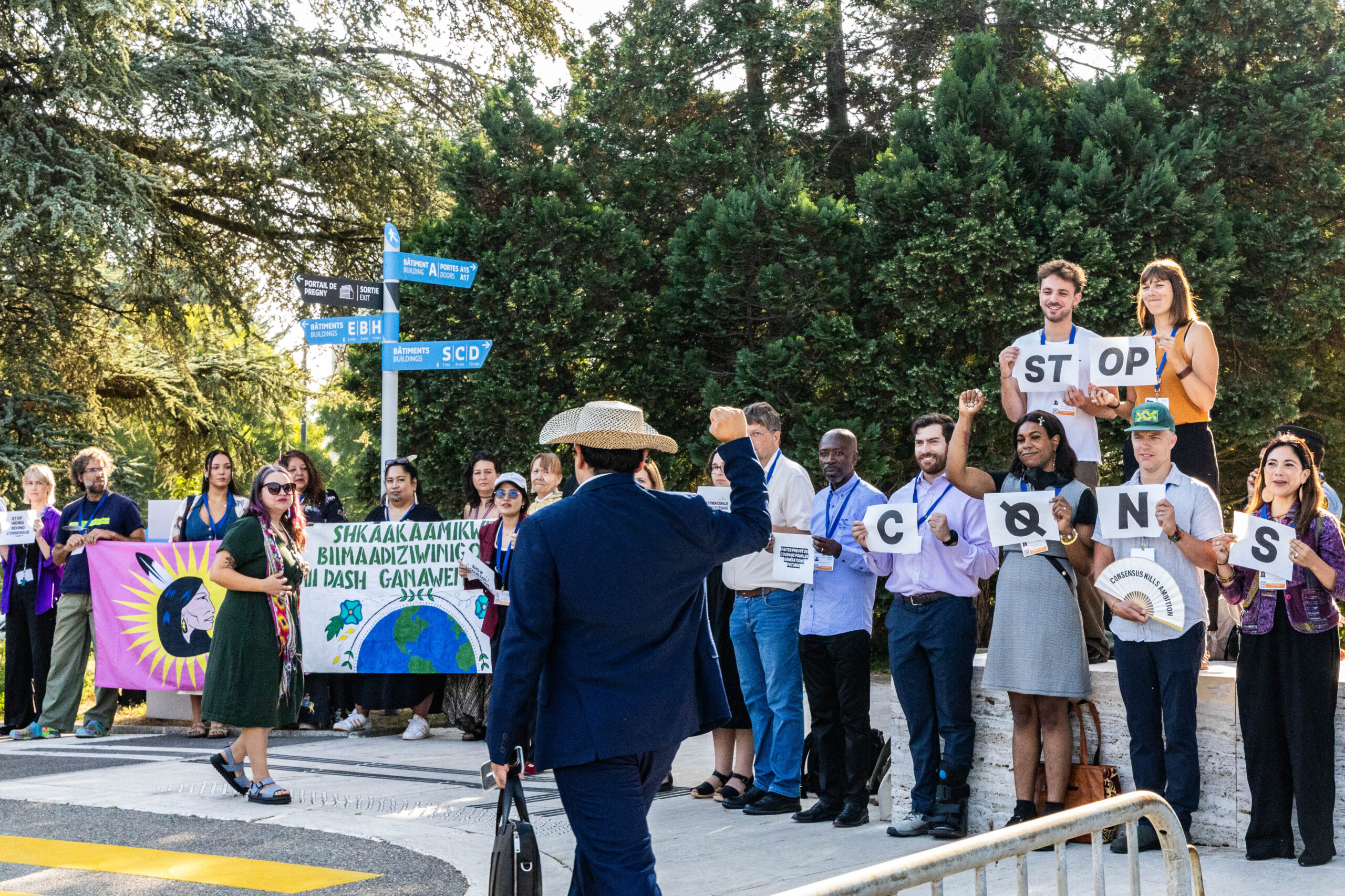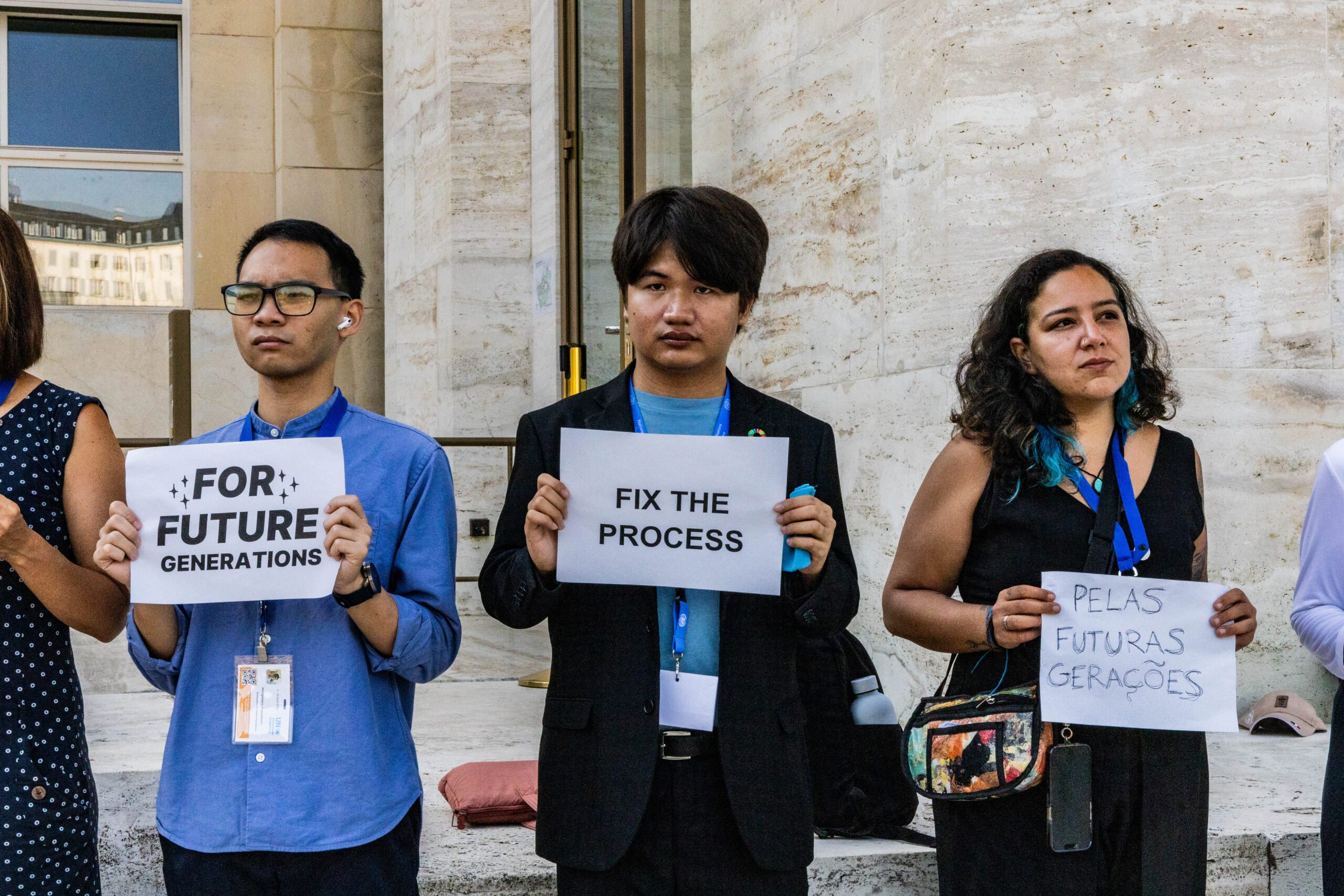Environmental campaigners have called on governments to “stop hiding behind consensus” at the UN plastics treaty talks and instead opt for a vote which they hope would win enough backing for an ambitious pact that tackles soaring plastic production.
Environmentalists and Indigenous groups held up signs urging countries to show courage, standing in front of the UN buildings in Geneva where negotiations are reaching the final stretch amid a continuing stalemate.
The demonstration, coordinated by the Break Free From Plastic movement of more than 13,000 organisations and individual supporters, coincided with the arrival of nearly 70 ministers at the talks.
“What we have seen here is that if you rely only on consensus, that means a single country or a handful of countries can block the entire process,” said Renée Sharp, director of plastics and petrochemical advocacy at the US-based Natural Resources Defense Council (NRDC). “We need strong action – we need a strong treaty,” she added.
Breaking the impasse
With only two days left until the negotiations are due to end, discussions have yet to settle on what the first global plastics pact should tackle.
A coalition of nearly 100 countries has pushed for the treaty to include binding provisions aimed at cutting plastic production to “sustainable levels” as part of a wide-ranging package of solutions.
But an ill-defined group of fossil-fuel producing nations, calling themselves the “like-minded” countries and vocally led by Gulf states, Russia and India, wants to limit the scope of the pact to management of plastic waste and largely voluntary measures.

Wong SiPeng, an advocate with C4 Center, an anti-corruption watchdog in Malaysia, said it would be impossible to make consensus work with two polar-opposite camps that do not want to budge.
“The clearest way to make a decision would be to vote and get us out of this gridlock,” she told Climate Home on the sidelines of Tuesday’s action. “This is not going anywhere – countries need to be brave enough to call for it.”
Voting battle
The issue of how governments should reach an agreement has haunted the UN plastics talks since their inception. The draft rules of procedure governing the negotiations offer the possibility of voting if efforts to reach consensus fail.
But the second round of talks in May 2023 descended into a procedural scuffle when countries, including Saudi Arabia, India and Iran, refused to move into substantive discussions unless that provision was ‘bracketed’ – meaning no agreement had been reached.
The row was eventually resolved with a compromise: an ‘interpretative statement’ noting that the rules of procedure would be applied provisionally and there were different understandings of the rule on voting.
In a panel discussion with Climate Home on Monday, David Azoulay, a senior attorney at the Center for International Environmental Law (CIEL), said fossil fuel-producing countries had since “laid a number of procedural traps to make it [voting] potentially politically costly and complicated”.
Looking for the right moment
A call for a vote would almost certainly provoke a strong reaction from the members of the “like-minded” group, which have regularly restated in their public speeches that all decisions must be made on consensus. At a plenary last Saturday, Kuwait – speaking on behalf of that group – said that “any attempt to move forward without consensus risks producing an instrument that is neither legitimate nor implementable”.
But for CIEL’s Azoulay, associating multilateralism exclusively with consensus decision-making is “complete and utter nonsense”. He pointed out that voting takes place regularly at the United Nations General Assembly in New York. Using that tool “is not weakening multilateralism, it is saving it,” he added.
Comment: The global plastics treaty must move forward, with or without the US
No country has so far openly signalled its intention to call for a vote at the plastics talks, despite the option being informally debated in the corridors of the UN headquarters in Geneva.


Laurianne Trimoulla, a project manager at the Switzerland-based Gallifrey Foundation, said a vote would need to take place “under the right circumstances when all conditions are perfectly aligned”.
“If countries call for a vote and it is not the right moment, it weakens the act of voting,” she added.
NRDC’s Sharp said some countries are hesitant to move beyond decisions approved by consensus because they do not want to give the impression that multilateralism has no future.
“But the reality is that human health and environmental health are on the line – and we can’t have countries hiding behind consensus to not take the action that’s needed,” she added.

